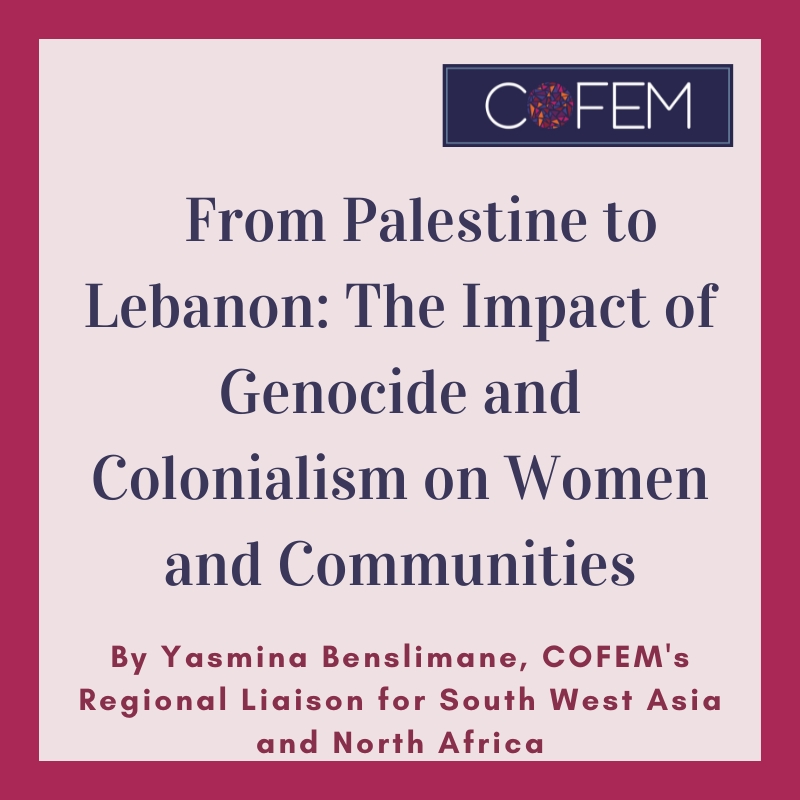Since October 7, 2023, Israel has intensified its military operations in Lebanon, leading to significant civilian casualties and widespread destruction. As of October 2024, over 2,448 deaths and 11,471 injuries have been reported, with 1.2 million people forcibly displaced across Lebanon, according to the Lebanese Ministry of Public Health. The humanitarian crisis now surpasses the 2006 war in scale and impact. Civilians are trapped under rubble, and many are unaccounted for as Israel continues its airstrikes despite calls for a ceasefire and international intervention. Historically, Lebanon has been a refuge for Palestinian and Syrian populations fleeing violence and persecution. The Sabra and Shatila massacre of 1982, where thousands were killed with Israeli complicity, remains a reminder of the violence faced by Palestinian refugees. This legacy of displacement and violence shapes the current experiences of Palestinian and Syrian women and girls, many of whom now face the compounded trauma of ongoing aggression, multiple displacements, and continued instability.
The Struggles of Women and Girls
The situation for women and girls in Lebanon is increasingly dire, exacerbated by ongoing military aggression, economic instability, and systemic gender inequalities. They bear the brunt of violence in these times, becoming the first victims in a landscape ravaged by militarism. Of the 1.2 million displaced, around 520,000 of them are women and girls now desperately seeking safety and basic needs. Women and girls are facing an alarming rise in domestic violence, sexual exploitation, and unmet health needs, particularly concerning their Sexual and Reproductive Health (SRH). The intersectionality of gender, nationality, and socioeconomic status exacerbates their vulnerability. Migrant women, many of whom hail from the African continent, work within Lebanon’s precarious labor market, often finding themselves in exploitative conditions. As resources dwindle and societal tensions escalate, these women encounter further risks of violence and exploitation, remaining largely invisible in a society already grappling with fragile infrastructure and limited services.
Moreover, the ongoing aggression amplifies the dire conditions for refugees, especially those who have endured multiple displacements. Many are grappling with renewed fears of losing their homes and loved ones, compounding their trauma. The health challenges they face are daunting: the displacement has severely impacted women’s health, particularly for those experiencing menstruation or pregnancy. Access to essential health services is critically limited, increasing the risks associated with pregnancy and reproductive health; reports indicate that about 2,300 pregnant women are among the displaced, with many lacking access to prenatal care. Gender-based violence (GBV) has surged in these emergency settings, with women and girls facing heightened vulnerabilities due to overcrowded living conditions in shelters and a lack of safety measures. Their struggles are often overlooked, yet their resilience and strength are central to movements for justice, as they navigate the complex web of violence and oppression, demanding recognition and rights amid an ongoing humanitarian crisis.
An Intersectional Feminist Perspective
An intersectional feminist analysis reveals the intricate layers of oppression faced by women in Lebanon, shaped by their diverse identities and the systemic injustices they endure. This situation demands a multifaceted approach, acknowledging that women in Lebanon are not a monolith. The legacy of colonialism, ongoing violence, and displacement—particularly as perpetuated by genocidal state actors like Israel and the United States (US)—requires urgent attention. Israel’s expansion of militarism, with support from the US, and its deliberate actions toward erasing entire communities must be recognized as a calculated strategy of genocide. The recent escalation of military aggression is part of a broader agenda to displace populations and obliterate cultural identities. The ramifications of this violence are profound, with women and girls bearing the brunt of the chaos, facing increased domestic violence, sexual exploitation, and significant barriers to healthcare. The international community’s failure to not only intervene or hold Israel accountable for its actions, but also its perpetuation of this violence —often masked by humanitarian aid initiatives that serve as aidwashing— underscores a broader complicity in this violence. This inaction allows the cycle of oppression to continue unchecked, leaving marginalized voices—particularly young feminists, queer communities, migrant workers, persons with disability and refugees—further silenced. Our struggle is for justice, not only for the suffering endured today but also for the historical injustices that persistently shape these lived realities. From a decolonial perspective, Lebanon’s situation exemplifies a systematic pattern of violence aimed at erasing identities and histories, demanding a robust and unified global response to dismantle these oppressive structures.
A Call to Action
We, at COFEM, reject the normalization of violence against our bodies, our sisters, and our communities. We demand an end to the genocide and a cessation of violence that knows no borders. The international community must act immediately to halt the cycle of violence and provide humanitarian aid to those displaced and suffering across Lebanon and the SWANA region. We stand in solidarity with the women and girls of Lebanon, Palestine, and Syria. It is our collective responsibility to demand an end to this violence, amplify the voices of those marginalized, and ensure their stories are told. We must hold accountable those who perpetuate this cycle of violence and commit to building a future where women are free from fear, free to thrive, and free to reclaim their narratives. Our struggle is not just against the illegal apartheid Israeli state but against the systems of inequality and oppression that perpetuate violence and exploitation. We stand in solidarity with all those fighting for liberation, dignity, and a future where every woman and girl can live free from violence and oppression.
Our fight is intertwined; when one of us suffers, we all suffer.
We are not free until we are all free.
We call for an end to the genocide, an end to the silence, and a commitment to a future where every woman and girl can live in safety and dignity.
Let us unite in our fight against colonial legacies and oppressive regimes.
Together, we will dismantle the structures that perpetuate violence, reclaim our narratives, our bodies, and our futures.
In solidarity, in struggle, and in love, we rise.
